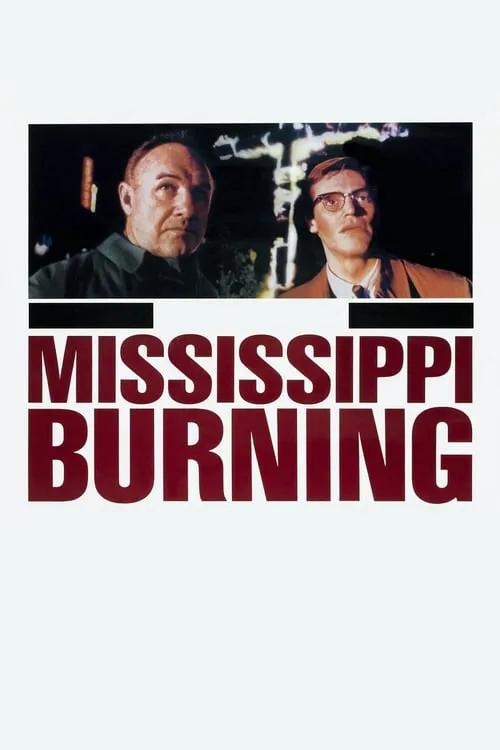Mississippi Burning

Plot
Mississippi Burning is a 1988 American drama thriller film directed by Alan Parker. The film is set in the 1960s and revolves around the true story of the disappearance and murder of three civil rights workers: James Chaney, Andrew Goodman, and Michael Schwerner. On June 21, 1964, these three men went to Neshoba County, Mississippi, to investigate the burning of a local African American church and to support local African Americans who were struggling for their rights. As their investigation progresses, they become increasingly entangled in the midst of racial tensions and violence. On the night of June 21, they were stopped by the local police and National Guard under the suspicion of being Communist spies. However, the actual reason for their arrest was their involvement with the Student Nonviolent Coordinating Committee (SNCC) to organize African American voter registration. In the film, two FBI agents, Agent Alan Ward (played by Willem Dafoe) and Agent Rupert Anderson (played by Gene Hackman), are sent to investigate the disappearance of the three civil rights workers. Agent Ward is a young, ambitious agent trained at the FBI Academy and is driven by his desire to uphold the law and bring justice to the victims. Agent Anderson, on the other hand, is a veteran ex-sheriff who has a deep understanding of the small-town culture and politics of Mississippi. He initially clashes with Agent Ward, who is eager to prove himself and challenge the local law enforcement's handling of the case. During their investigation, the two agents face resistance and hostility from the local authorities and white communities. They struggle to find witnesses who are willing to come forward and provide information, as the town is steeped in a culture of segregation and intimidation. The agents' efforts are hindered by the racial divide, and they must navigate the complexities of racial politics to uncover the truth. The film depicts the agents' growing frustration as they are met with silence and inaction from the local authorities. The FBI is seen as an outsider institution that is meddling in the affairs of a small town where everyone knows each other. The agents' actions are seen as a threat to the status quo, and they are viewed with suspicion by the white community. As the investigation unfolds, the agents come to realize that the disappearance of the civil rights workers is part of a larger pattern of violence and intimidation against African Americans in the town. The town's officials and local leaders are shown to be complicit in the suppression of African American rights and the perpetuation of racial segregation. The film's title, Mississippi Burning, reflects the racial tensions and violence that the state was experiencing during the 1960s. The title refers to the church burnings and other forms of violence that were perpetrated against African American communities. The film's narrative builds towards a dramatic confrontation between the agents and the perpetrators of the murder, which ultimately leads to the exposure of the truth and the arrest of the perpetrators. Gene Hackman, in one of his most memorable roles, delivered an outstanding performance as Agent Rupert Anderson, bringing depth and nuance to the character. His portrayal of a veteran ex-sheriff who is faced with the moral complexities of the case is both convincing and poignant. The film's cinematography and production design are noteworthy for capturing the atmosphere of the Deep South during the 1960s. The film's use of lighting, camera angles, and sets creates a visually striking portrayal of a era of great social change and upheaval. Mississippi Burning received widespread critical acclaim upon its release. It was nominated for two Academy Awards and has since become a landmark film in the history of American cinema. The film's portrayal of racial tensions and violence during the 1960s remains a powerful reminder of the need for continued progress towards greater social equality and justice. The film's exploration of the complexities of racial politics and the role of institutions in perpetuating inequality has resonated with audiences for decades. The film's themes of courage, resilience, and the importance of upholding the law in the face of oppression are timeless and continue to inspire viewers today. Mississippi Burning is a powerful and thought-provoking film that challenges viewers to confront the darker aspects of American history. The film's portrayal of the struggles faced by African Americans during the 1960s remains a haunting reminder of the progress that still needs to be made towards achieving greater social justice and equality for all.
Reviews
Everly
Set against the backdrop of the KKK's persecution of Black people in the historical period. The two FBI agents are depicted with contrasting personalities, one temperamental and the other rational. Gene Hackman and Willem Dafoe both deliver excellent performances. The overall atmosphere of the film is quite oppressive, but the ending shifts too quickly. The easier and simpler justice comes, the cheaper it feels, rendering the preceding buildup meaningless. "True Detective" and "Fargo" likely drew inspiration from this film. Three and a half stars.
Recommendations




